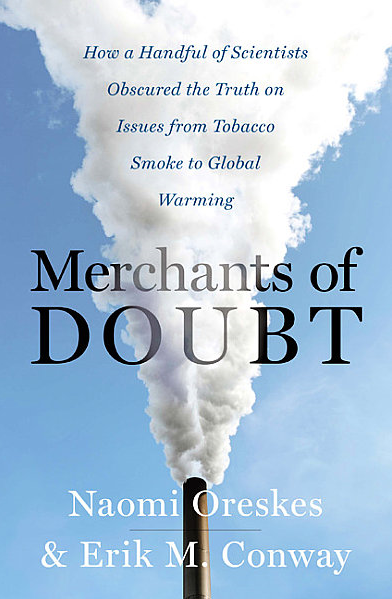Books I Read: "Merchants of Doubt"

This one is actually a bit overdue. I finished the book in early December, after it was recommended to me at the end of October, after a discussion about why it is that some people don’t seem willing to accept scientific consensus. “Merchants of Doubt” does go a ways toward shedding some light on the issue, along with providing the reader with enough evidence of willful and deliberate efforts by industry to confuse the public record on various scientific issues that might result in increased governmental regulation, that by the end of the book you pretty much want to punch someone in the face (like this guy, for instance).
The book starts with the tobacco industry’s various attempts to disrupt the scientific process that lead to the now firmly established consensus that cigarettes cause cancer. From there, it moves through most of the “controversial” scientific conclusions of the last half-century: nuclear proliferation, ozone depletion, acid precipitation, second-hand smoke, climate change, and the over-application of pesticides. It’s a thorough journey through pretty much every awful thing the species is doing to the only planet that we can live on. The authors provide hundreds of sources per chapter, and the tone is engaging, if not a bit polemical at points (though really, given the subject, if you can’t be polemical here, where can you be?).
There wasn’t too much that was all that surprising to me. I did find the notion that most of the scientists who were complicit (perhaps not the best term) in muddying the waters of public perception did so as a direct result of their cold-war thinking to be interesting. As a child of the last fifth of the 20th century, the Cold War does not loom large in my own mind. It becomes a bit easier to understand why someone would be stridently anti-regulation when their mental exemplar of a tightly regulated system is the Soviet Union. I’m not suggesting that the analogy is appropriate (or even sane, given the ongoing degredation of most terrestrial ecosystems), but I can at least see the perspective. And I was glad to see the authors turn their evidence machine full force on the bizarre (and vehemently anti-factual) backlash to Rachel Carson and Silent Spring that has really come to the fore during the past decade. Though the notion that once enough time elapses, people will just start making up nonsense to support their arguments is discomforting to say the least.
If you are interested in the history of the relationship between science and industry, particularly during the past sixty years, this is probably the book for you. Similarly, if you are interested in how industry goes about mucking up the popular perception of the scientific process, you might start with this book. If, however, you subscribe to the notion that there really is something to all of that contrarian, denialist, garbage that gets bandied about in the press, this is not a book that will make you feel secure in your sentiments (who am I kidding, if you feel that way, you won’t be reading this book).